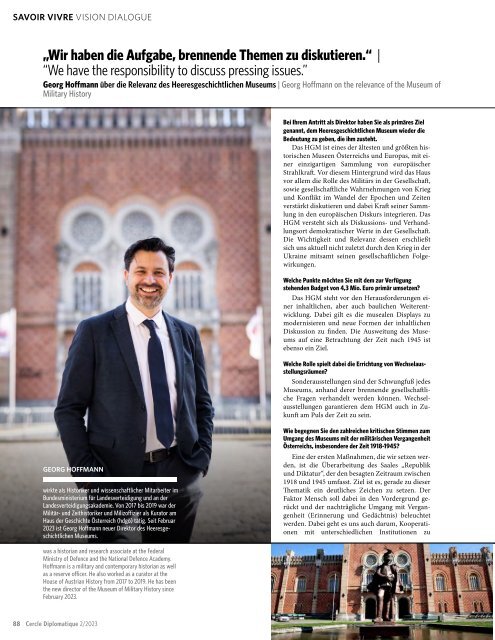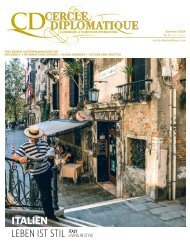CERCLE DIPLOMATIQUE - issue 02/2023
CD is an independent and impartial magazine and is the medium of communication between foreign representatives of international and UN-organisations based in Vienna and the Austrian political classes, business, culture and tourism. CD features up-to-date information about and for the diplomatic corps, international organisations, society, politics, business, tourism, fashion and culture. Furthermore CD introduces the new ambassadors in Austria and informs about designations, awards and top-events. Interviews with leading personalities, country reports from all over the world and the presentation of Austria as a host country complement the wide range oft he magazine.
CD is an independent and impartial magazine and is the medium of communication between foreign representatives of international and UN-organisations based in Vienna and the Austrian political classes, business, culture and tourism. CD features up-to-date information about and for the diplomatic corps, international organisations, society, politics, business, tourism, fashion and culture. Furthermore CD introduces the new ambassadors in Austria and informs about designations, awards and top-events. Interviews with leading personalities, country reports from all over the world and the presentation of Austria as a host country complement the wide range oft he magazine.
Create successful ePaper yourself
Turn your PDF publications into a flip-book with our unique Google optimized e-Paper software.
SAVOIR VIVRE VISION DIALOGUE<br />
„Wir haben die Aufgabe, brennende Themen zu diskutieren.“ |<br />
“We have the responsibility to discuss pressing <strong>issue</strong>s.”<br />
Georg Hoffmann über die Relevanz des Heeresgeschichtlichen Museums | Georg Hoffmann on the relevance of the Museum of<br />
Military History<br />
Interview: Rois & Stubenrauch<br />
„Belagerung und<br />
Entsatz von Wien<br />
1683“, anonym.<br />
“Siege and relief of<br />
Vienna 1683“,<br />
anonymous.<br />
INFO<br />
GEORG HOFFMANN<br />
wirkte als Historiker und wissenschaftlicher Mitarbeiter im<br />
Bundesministerium für Landesverteidigung und an der<br />
Landesverteidigungsakademie. Von 2017 bis 2019 war der<br />
Militär- und Zeithistoriker und Milizoffizier als Kurator am<br />
Haus der Geschichte Österreich (hdgö) tätig. Seit Februar<br />
2<strong>02</strong>3 ist Georg Hoffmann neuer Direktor des Heeresgeschichtlichen<br />
Museums.<br />
Bei Ihrem Antritt als Direktor haben Sie als primäres Ziel<br />
genannt, dem Heeresgeschichtlichen Museum wieder die<br />
Bedeutung zu geben, die ihm zusteht.<br />
Das HGM ist eines der ältesten und größten historischen<br />
Museen Österreichs und Europas, mit einer<br />
einzigartigen Sammlung von europäischer<br />
Strahlkraft. Vor diesem Hintergrund wird das Haus<br />
vor allem die Rolle des Militärs in der Gesellschaft,<br />
sowie gesellschaftliche Wahrnehmungen von Krieg<br />
und Konflikt im Wandel der Epochen und Zeiten<br />
verstärkt diskutieren und dabei Kraft seiner Sammlung<br />
in den europäischen Diskurs integrieren. Das<br />
HGM versteht sich als Diskussions- und Verhandlungsort<br />
demokratischer Werte in der Gesellschaft.<br />
Die Wichtigkeit und Relevanz dessen erschließt<br />
sich uns aktuell nicht zuletzt durch den Krieg in der<br />
Ukraine mitsamt seinen gesellschaftlichen Folgewirkungen.<br />
Welche Punkte möchten Sie mit dem zur Verfügung<br />
stehenden Budget von 4,3 Mio. Euro primär umsetzen?<br />
Das HGM steht vor den Herausforderungen einer<br />
inhaltlichen, aber auch baulichen Weiterentwicklung.<br />
Dabei gilt es die musealen Displays zu<br />
modernisieren und neue Formen der inhaltlichen<br />
Diskussion zu finden. Die Ausweitung des Museums<br />
auf eine Betrachtung der Zeit nach 1945 ist<br />
ebenso ein Ziel.<br />
Welche Rolle spielt dabei die Errichtung von Wechselausstellungsräumen?<br />
Sonderausstellungen sind der Schwungfuß jedes<br />
Museums, anhand derer brennende gesellschaftliche<br />
Fragen verhandelt werden können. Wechselausstellungen<br />
garantieren dem HGM auch in Zukunft<br />
am Puls der Zeit zu sein.<br />
Wie begegnen Sie den zahlreichen kritischen Stimmen zum<br />
Umgang des Museums mit der militärischen Vergangenheit<br />
Österreichs, insbesondere der Zeit 1918-1945?<br />
Eine der ersten Maßnahmen, die wir setzen werden,<br />
ist die Überarbeitung des Saales „Republik<br />
und Diktatur“, der den besagten Zeitraum zwischen<br />
1918 und 1945 umfasst. Ziel ist es, gerade zu dieser<br />
Thematik ein deutliches Zeichen zu setzen. Der<br />
Faktor Mensch soll dabei in den Vordergrund gerückt<br />
und der nachträgliche Umgang mit Vergangenheit<br />
(Erinnerung und Gedächtnis) beleuchtet<br />
werden. Dabei geht es uns auch darum, Kooperationen<br />
mit unterschiedlichen Institutionen zu<br />
PHOTOS: HGM / LECHNER, N. MEISTER (4)<br />
schaffen und so eine Vielstimmigkeit zu erzeugen.<br />
Wie möchten Sie auf brennende Themen reagieren - Stichwort:<br />
Krieg in der Ukraine?<br />
Das HGM hat als Teil des kulturellen Gedächtnisses<br />
der Gesellschaft die Aufgabe, brennende gesellschaftliche<br />
Themen zu diskutieren – vor allem<br />
wenn diese mit Militär, Krieg oder Sicherheitspolitik<br />
in Verbindung stehen. Die Stärkung demokratischer<br />
Werte ist dabei ein wichtiges Ziel. Aktuelle<br />
Themen sollen nicht nur vor Ort im Museum selbst,<br />
sondern auch im digitalen Raum und im Vermittlungsprogramm<br />
aufgegriffen werden.<br />
Vor Ihrem Antritt als Direktor des Heeresgeschichtlichen<br />
Museums waren Sie auch im Haus der Geschichte<br />
Österreich als Kurator tätig. Sehen Sie thematische<br />
Überschneidungen der beiden Museen?<br />
Ich sehe grundsätzlich Überschneidungen zu allen<br />
historischen Museen und damit selbstverständlich<br />
auch zum Haus der Geschichte Österreich. Besondere<br />
Anknüpfungspunkte ergeben sich hier<br />
natürlich in der Betrachtung des 20. Jahrhunderts<br />
und der gegenwartsbezogenen Diskussion. Hier<br />
werden wir verstärkt gerade in den Schnittfeldern<br />
auf eine breite Zusammenarbeit und einen gegenseitigen<br />
Austausch setzen.<br />
As director, your primary goal was to restore the Museum of<br />
Military History to its rightful place of importance.<br />
The HGM is one of Austria and Europe’s oldest<br />
and largest historical museums, boasting a unique<br />
and influential collection. Against this backdrop,<br />
the museum is increasingly focusing on the role of<br />
the military in society and examining how society’s<br />
perception of war and conflict has evolved, incorporating<br />
its collection into the wider European discourse.<br />
The HGM aims to serve as a platform for<br />
the discussion and negotiation of democratic values<br />
in society. Its importance and relevance are currently<br />
highlighted by events such as the ongoing<br />
conflict in Ukraine and its social aftermath.<br />
What are the main priorities you would like to address with<br />
the available budget of 4.3 million euro?<br />
The HGM faces significant challenges in terms<br />
of both content and infrastructure development.<br />
This includes modernising the museum displays<br />
and exploring new ways of engaging visitors with<br />
the museum’s exhibits. Additionally, the museum<br />
aims to expand its focus to include the post-1945<br />
era.<br />
How important is the establishment of temporary exhibition<br />
spaces in achieving these goals?<br />
Temporary exhibitions are a vital component of<br />
any museum, providing a platform for exploring<br />
pressing social <strong>issue</strong>s. Through these exhibitions,<br />
HGM will remain relevant and up to date in the future.<br />
How do you respond to the many criticisms of the museum’s<br />
handling of Austria’s military past, particularly the period<br />
from 1918-1945?<br />
One of our first actions will be to revise the “Republic<br />
and Dictatorship” exhibit, which covers the<br />
aforementioned period from 1918 to 1945. Our<br />
goal is to make a clear statement on this topic. We<br />
will focus on the human factor and examine how<br />
we deal with the past through memory and commemoration.<br />
We also aim to foster partnerships with<br />
various institutions to promote diversity of perspectives.<br />
How do you plan to respond to pressing <strong>issue</strong>s, such as the<br />
war in Ukraine?<br />
As part of society’s cultural memory, HGM has a<br />
responsibility to discuss pressing social <strong>issue</strong>s, particularly<br />
those related to military, war, and security<br />
policies. Strengthening democratic values is a crucial<br />
goal. We aim to address current topics not only<br />
within the museum but also through our digital<br />
channels and educational programmes.<br />
Before your appointment as director of the Museum of Military<br />
History, you worked as a curator at the House of Austrian<br />
History. Do you see any topical overlaps between the two museums?<br />
I see overlaps with all historical museums, including<br />
the House of Austrian History. In particular,<br />
there are many points of intersection in the examination<br />
of the 20th century and current societal <strong>issue</strong>s.<br />
We will focus on fostering broad collaboration<br />
and mutual exchange, particularly in these areas of<br />
intersection.<br />
Kriege gehören<br />
ins Museum<br />
Wars Belong in<br />
Museums<br />
Die Dauerausstellung des<br />
HGM rollt anhand von<br />
Artefakten wie einem<br />
türkischen Audienzzelt<br />
oder dem Automobil des<br />
Tronfolgers Franz<br />
Ferdinand in Sarajevo die<br />
Geschichte des<br />
österreichischen<br />
Militärwesens von den<br />
kriegerischen Konflikten<br />
der Habsburgermonarchie<br />
bis zum Zweiten Weltkrieg<br />
auf.<br />
The permanent exhibition<br />
at HGM traces the history<br />
of the Austrian military,<br />
from the warring conflicts<br />
of the Habsburg monarchy<br />
to World War II, through<br />
artefacts such as a Turkish<br />
audience tent and the<br />
automobile of Crown Prince<br />
Franz Ferdinand in Sarajevo.<br />
hgm.at<br />
was a historian and research associate at the Federal<br />
Ministry of Defence and the National Defence Academy.<br />
Hoffmann is a military and contemporary historian as well<br />
as a reserve officer. He also worked as a curator at the<br />
House of Austrian History from 2017 to 2019. He has been<br />
the new director of the Museum of Military History since<br />
February 2<strong>02</strong>3.<br />
Der von Theophil Hansen<br />
geplante Museumsbau<br />
wurde 1856 eröffnet.<br />
The museum building<br />
planned by Theophil Hansen<br />
was opened in 1856.<br />
88 Cercle Diplomatique 2/2<strong>02</strong>3<br />
Cercle Diplomatique 2/2<strong>02</strong>3<br />
89
















